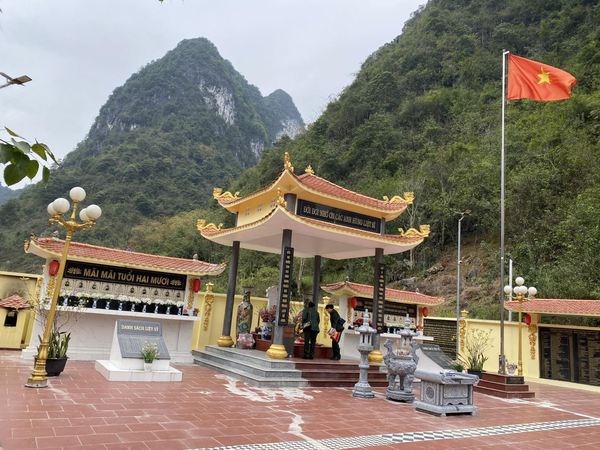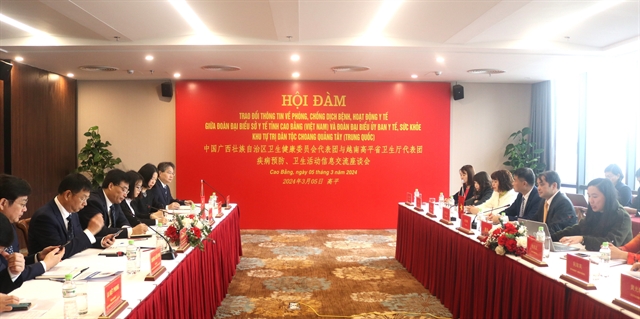 Society
Society

 |
| A talk on disease prevention and control, and healthcare activities between the Department of Health of Vietnam's Cao Bang province and the Health Commission of China's Guangxi Zhuang Autonomous Region is organised in Cao Bang city on March 5. — VNA/VNS Photo |
CAO BẰNG — A talk exchanging information on disease prevention and control, and healthcare activities between delegations of the Department of Health of Việt Nam's Cao Bằng province and the Health Commission of China's Guangxi Zhuang Autonomous Region was organised in Cao Bằng city on March 5.
According to Nông Tuấn Phong, Director of the Department of Health of Cao Bằng, the talk aimed to further promote the comprehensive implementation of the joint statement on continuing to deepen and elevate the comprehensive strategic cooperative partnership between Việt Nam and China, and important common perceptions reached by the two countries’ leaders.
Both sides were committed to implementing the outcomes reached at the 2024 spring meeting between secretaries of the Party committees, the 15th meeting of the Joint Working Committee of, and the medical exchange conference of the Guangxi Zhuang Autonomous Region and the four Vietnamese provinces of Hà Giang, Quảng Ninh, Lạng Sơn and Cao Bằng in 2023; and a memorandum of understanding (MOU) on medical cooperation between the four Vietnamese border provinces and Guangxi.
In 2023, the Cao Bằng Department of Health and the Health Commission of the Guangxi Zhuang Autonomous Region engaged in numerous friendly exchange activities and cooperation in health care. The two sides stepped up information sharing and coordination in preventing and controlling infectious diseases such as the COVID-19 pandemic, plague, and monkeypox, especially cross-border infectious diseases.
The two sides also enhanced coordination and control for disease-carrying intermediate hosts at land border checkpoints between the two countries; managed health quarantine for humans, vehicles crossing the border, exported and imported goods, medical microbiological samples, biological products, human tissues and organs transported through pairs of land border gates between the two countries.
Du Zhenzong, Head of the Health Commission of the Guangxi Zhuang Autonomous Region, said the two sides have collaborated effectively, especially in preventing and controlling infectious diseases, minimising the risks of cross-border infectious diseases, and deepening the relationship between the people of Việt Nam and China.
He expressed his hope that the two sides will continue to maintain their relationship, information exchanges, and boost cooperation to reduce the spread of diseases that can be transmitted across the border.
The official hoped to cooperate with the Department of Health of Cao Bằng in personnel training, especially in providing further training and technical skills for medical officials and health care givers.
He suggested the two sides discuss developing specific plans for improving the quality of medical examination and treatment, public health, treatment techniques, and traditional medicine and strengthening cooperation in treating cross-border infectious diseases.
Quangxi welcomes Vietnamese citizens to experience its advanced healthcare services and will create the most favourable conditions for these tourists, Du affirmed.
The two sides’ medical agencies are considering establishing and implementing win-win cooperation mechanisms and partnerships between Cao Bằng and Guangxi, tapping their resources and harnessing potential to bring a brighter future to the health sector of the two countries.
Additionally, they can conduct emergency response drills, share information on infectious diseases, and traditional medicine, especially in preventing and treating Mediterranean anemia; and agree on a collaborative model to ensure patients receive the best possible healthcare services available today. — VNA/VNS




